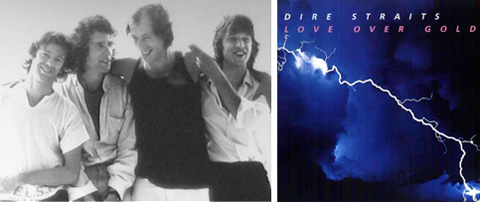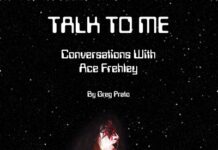Dire Straits photo courtesy John IIlsley
Dire Straits
Love Over Gold
Dire Straits has been eligible for induction into the Rock and Roll Hall of Fame since 2003. Fifteen years later, the influencers that be might make the right decision by finally letting the band in.
If the group is inducted and decides to perform (here’s hoping!), it’s all but guaranteed ceremony attendees will be treated to the group’s biggest hits, “Sultans of Swing” and “Money for Nothing” included. If a third tune can be squeezed in, chances are decent it’ll stem from their terrific 1980 album Making Movies. Perhaps “Skateaway”? “Tunnel of Love”? Regardless, as band bassist John Illsley told me recently, “It’s a pleasure and an honor to be nominated.”
The sad reality though is the Rock Hall heads will likely overlook anything from the group’s wholly underrated 1982 album Love Over Gold. Sandwiched in-between Making Movies and the band’s mega-selling 1985 work Brothers In Arms, this five-track collective peaked high and sold well overseas. Yet while it went gold in America, it falls behind commercially compared to the group’s other albums, even though it’s arguably their greatest work.
There are several possible reasons for why this is: The album’s opening track is one of the band’s all-time best, and it’s more than 14 minutes long; all band members sound freer and more expansive on tracks, especially frontman Mark Knopfler; there’s a terrific blue-collar moodiness on certain songs that differs greatly from the idyllic romanticism conveyed on their prior album. Plus, piano and keyboards become an integral part of the instrumental mix.
I admit it took me a few listens over the years to fully appreciate the power of Love Over Gold. For me one track — “Telegraph Road” — defined the work given its epic nature and beautifully bleak lyrics. Imagine Elton John’s “Funeral For A Friend” if conceived by Bob Dylan. Trying to get a better sense of where the band was coming from musically and inspirationally during this time period, I reached out to Illsley via email, who is currently in the midst of a European tour.
Love Over Gold was a natural progression for the band as the live shows were becoming more expansive due to adding keyboards to the lineup,” Illsey told me. “’Telegraph Road’ was actually worked out during the soundcheck on the Making Movies tour. Always a bit of an issue following a successful album but, as usual, Mark was writing such interesting songs. It was a pleasure to record them.”
“Telegraph Road” alone is sprawling and masterful, as it reflects a Steinbeck-esque narrative about societal foundations and tribulations, and the plight of the modern worker. “I used to like to go to work but they shut it down; I’ve got a right to go to work but there’s no work here to be found,” Knopfler laments, channeling not just Dylan but Woody Guthrie and other folk icons of the pre- and post-Tom Joad eras. The track ultimately culminates with a minutes-long wailing guitar solo from Knopfler, surpassing “Tunnel of Love” as his most distinctive recorded with the band.
When I asked Illsley to describe the recording process of “Telegraph Road,” he responded with a single sentence: “A lot of work on getting the dynamics and flow right — a kind of controlled power until the playout.”
Love Over Gold marked the second time the band would record at the Record Plant in New York City with producer extraordinaire Jimmy Iovine (Bruce Springsteen, Tom Petty, Stevie Nicks). The same power in the production talent behind the console also extended to the band’s music, Illsley told me.
“I remember us trying out many grand pianos from all the main suppliers in New York to get that sound you hear on ‘Private Investigations.’ We also tried so many snare drum skins and bass strings searching for perfection,” he said. “Did we find it? Who knows, maybe [we] got close.”
They did.
While not a perfect album, Love Over Gold was the perfect album to come from Dire Straits at the time as the band is unafraid to take musical risks and defy convention to get listeners thinking. Track two, “Private Investigations,” carries the kind of strong emotional weight Knopfler revisits on future tracks like “Brothers In Arms.” Knopfler himself summons Raymond Chandler on the tune as he depicts black and white scenery laden with secrets and smoke. Somber in melody, the track also includes slashing electric guitar which seemingly comes out of the nowhere in the darkness.
You get a jolt hearing this, especially if you’re driving alone at night with the song playing in the car. It explains why the album’s cover is a lightning bolt across an ominous sky – it’s all about experiencing that jolt for a moment in time.
The album’s remaining three tracks — “Industrial Disease,” “Love Over Gold” and “It Never Rains” — harken a bit back to Dire Straits’ traits of frivolity and sentiment. They also average six minutes or more apiece. Yet each one possesses its own individuality — “Industrial Disease” has Knopfler Cockney-fying his vocals; “Love Over Gold” features the inclusion of marimba; “It Never Rains” is subdued but harkens back to Dylan’s influence on Knopfler. This could be why the legendary guitarist produced Dylan’s Infidels album of 1983 after first appearing on the legend’s Christian work Slow Train Coming in 1979.
“Every album stands alone. I think they each have their unique character,” Illsley told me. “What clues them all together is the sound and individual characters of the band.”
The hope is now these individual characters will come together, if inducted, and be the true highlight of the night by playing live for the first time in 25 years. If so, I’ll be eagerly watching to see if a track from Love Over Gold makes the final cut.
***
Share your feedback and suggestions for future columns with Ira at vinylconfessions84@gmail.com.




















